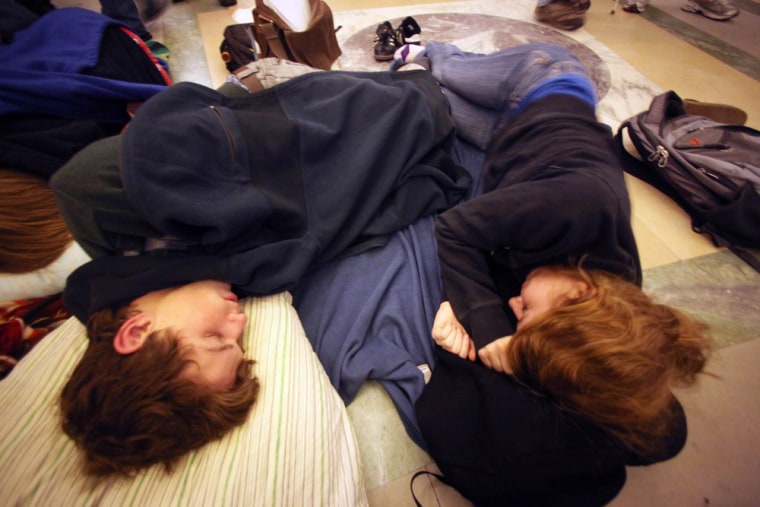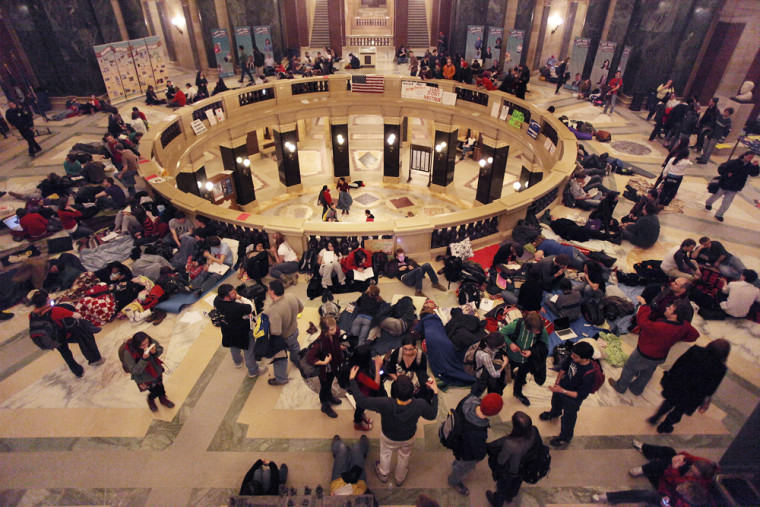A bill eliminating most collective bargaining rights from nearly all Wisconsin public employees passed the Legislature's budget-writing committee late Wednesday night despite two days of mass public protests.
The bill went through with all Republicans backing it and no Democratic support.
The vote clears the way for the Senate to take up the bill Thursday.
Thousands of protesters packed the Capitol Rotunda to watch the hearing on television monitors, booing and screaming when supporters of the measure talked. Protesters packed the Capitol all day Tuesday during a 17-hour hearing, overnight and again all day Wednesday.
But their attempts to change the bill proposed by new Republican Gov. Scott Walker were in vain. Republicans made some changes, but nothing that would keep bargaining rights intact.
School districts in Madison and other Wisconsin cities said there will be no classes Thursday as the state's largest teachers union called on all 98,000 of its members who could to attend rallies at the capital.
"This is not about protecting our pay and our benefits," Wisconsin Education Association Council President Mary Bell said at a press conference on the Capitol Square. "It is about protecting our right to collectively bargain."
Wisconsin in 1959 became the first state to grant collective bargaining to government workers.
Walker is seeking passage of the nation's most aggressive anti-union proposal.
The Statehouse filled with as many as 10,000 demonstrators, and many Madison teachers joined the protest by calling in sick in such numbers that the district had to cancel classes.
As protesters chanted outside his office door on the second consecutive day of demonstrations, Walker insisted he has the votes to pass the measure, which he says is needed to help balance a projected $3.6 billion budget shortfall and avoid widespread layoffs.
Walker said he appreciated the concerns of protesters, but taxpayers "need to be heard as well." Although he said he was open to making changes, he promised not to do anything that would "fundamentally undermine the principles" of the bill.
"We're at a point of crisis," the governor said.
In addition to eliminating collective bargaining rights, the legislation would also make public workers pay half the costs of their pensions and at least 12.6 percent of their health care coverage — increases that Walker calls "modest" compared to those in the private sector.
'Kill this bill!'
More than 13,000 protesters gathered at the Capitol on Tuesday for a 17-hour public hearing on the measure. Thousands more came Wednesday. Some stood outside the governor's door, chanting "Recall Walker now!"
More than 1,000 protesters, many of whom spent the night in sleeping bags on the floor of the Rotunda, shouted "Kill this bill!" on Wednesday.
"I'm fighting for my home and my career," said Virginia Welle, a 30-year-old teacher at Chippewa Falls High School. She said she and her husband, who is also a teacher, each stand to lose $5,000 a year in higher pension and health care contributions.
Welle said she could never get that money back since the unions would be unable to bargain over benefits under Walker's plan.
There were some indications Wednesday that support for the plan may be waning among Republicans who control the Legislature.
Senate Republicans met in secret to discuss the bill. Asked where the GOP stood, Sen. Dan Kapanke of La Crosse told The Associated Press, "That's a really good question. I don't know."
On Tuesday, the Milwaukee-Wisconsin Journal Sentinel that several members of the Green Bay Packers — who are part of the National Football League Players Association — came out against Walker's plan.
"As a publicly owned team we wouldn't have been able to win the Super Bowl without the support of our fans," reads a statement signed by seven current and former players. "It is the same dedication of our public workers every day that makes Wisconsin run. They are the teachers, nurses and child care workers who take care of us and our families. But now in an unprecedented political attack Governor Walker is trying to take away their right to have a voice and bargain at work."

Protests taking toll
The protests have been larger and more sustained than any in Madison in decades. Dozens of protesters spent the night in sleeping bags on the floor of the Rotunda. A noise monitor in the Rotunda registered 105 decibels at midday Wednesday — approximately the same volume as a power mower or chainsaw.
Beyond the Statehouse, more than 40 percent of the 2,600 union-covered teachers and school staff in Madison called in sick, forcing the superintendent to call off classes in the state's second-largest district. No other widespread sickouts were reported at any other school.
Prisons, which are staffed by unionized guards who would lose their bargaining rights under the plan, were operating without any unusual absences, according to a Department of Corrections spokeswoman.
Walker has said he would call out the National Guard to staff the prisons if necessary. A union leader for prison workers did not immediately return messages.
Democrats said the bill would be tough to stop. Democrats lost the governor's office and control of the Legislature in the November midterm elections.
"The Legislature has pushed these employees off the cliff, but the Republicans have decided to jump with them," said Sen. Bob Jauch, one of 14 Democrats in the 33-member chamber.
While other states have proposed bills curtailing labor rights, Wisconsin's measure is the most aggressive anti-union move yet to solve state budget problems. It would end collective bargaining for state, county and local workers, except for police, firefighters and the state patrol.
Protesters targeted the budget committee's public hearing Tuesday to launch what Vos called a "citizen filibuster," which kept the meeting going until 3 a.m. Wednesday.
Two floors below the hearing, dozens of University of Wisconsin-Madison teaching assistants and students poured into the Capitol rotunda late Tuesday evening, putting down sleeping bags and blankets. Many were asleep on the floor when the hearing ended.
Workers' rights part of state history
Wisconsin has long been a bastion for workers' rights. The American Federation of State, County and Municipal Employees was founded in 1936 in Madison.
But when voters elected Walker, an outspoken conservative, along with GOP majorities in both legislative chambers, it set the stage for a dramatic reversal of Wisconsin's labor history.
Under Walker's plan, state employees' share of pension and health care costs would go up by an average of 8 percent. The changes would save the state $30 million by June 30 and $300 million over the next two years to address a $3.6 billion budget shortfall.
Unions could still represent workers, but could not seek pay increases above those pegged to the Consumer Price Index unless approved by a public referendum. Unions also could not force employees to pay dues and would have to hold annual votes to stay organized.
In exchange for bearing more costs and losing bargaining leverage, public employees were promised no furloughs or layoffs. Walker has threatened to order layoffs of up to 6,000 state workers if the measure does not pass.
Wisconsin is one of about 30 states with collective bargaining laws covering state and local workers.
Walker has argued that the concessions are moderate compared with those suffered by many other Americans during the recession. Democratic opponents and union leaders say his real motive is to strike back at political opponents who have supported Democrats over the years.
